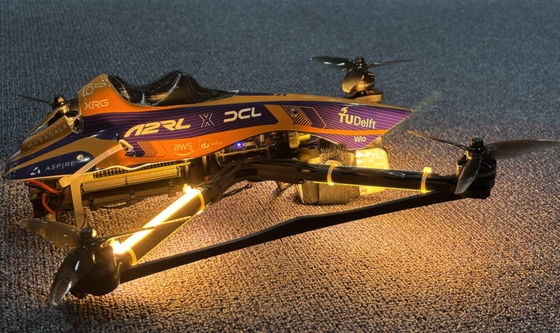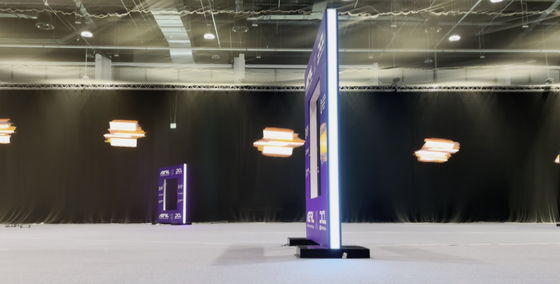AI-controlled autonomous drone beats human champion in international race for the first time, flying with just one camera like a human

An autonomous drone developed by a research team at Delft University of Technology, a national university in the Netherlands, won a drone race held in Abu Dhabi, the capital of the United Arab Emirates. In the race, Delft University of Technology's autonomous drone outperformed drones operated by the world's best drone pilots.
Autonomous drone from TU Delft defeats human champions in historic racing first

The Abu Dhabi Autonomous Racing League (A2RL), a division of the Abu Dhabi Advanced Technology Research Council (ATRC) established to make the UAE a global leader in advanced technology, is challenging the limits of autonomous technology. In partnership with the Drone Champions League (DCL), the world's largest drone race featuring professional drone racing teams, A2RL x DCL Autonomous Drone Championship was held, the first of its kind in the Middle East.
This drone championship featured the 'Falcon Cup,' a drone race between human pilots, and the 'A2RL Drone Championship,' a race between autonomous drones equipped with AI. The winner of the Falcon Cup was RAIDEN RACING , Japan's first professional drone racing team.
The AI drone developed by Delft University of Technology first won the A2RL drone championship, then competed in a knockout tournament against human pilots and won, beating three former DCL world champions in the knockout tournament.
All drones used in the race were standardized, equipped with NVIDIA Jetson AGX Orin , a forward-facing camera, and an inertial measurement unit (IMU) for on-board perception and control.

In order to challenge the physical limits of AI, this drone championship restricts participating drones to 'use only one camera,' which is a major difference from conventional autonomous drone races. Having only one camera to monitor the front is very similar to the way a human FPV (first-person) pilot flies, making it very difficult for the AI to recognize the surrounding environment.
Delft University of Technology's drone beat 13 other autonomous drones and a 'human-operated drone' piloted by a drone racing champion, using deep learning to achieve high-performance control. According to the Delft University of Technology's drone racing team, the AI drone recorded a top speed of 95.8 km/h on the winding course.
The Delft University of Technology drone team reports that they achieved this feat by developing an efficient and robust AI system that enables instant, high-performance control. The groundbreaking events of AI beating world champions in chess and Go have mainly occurred in virtual space, but the result of 'AI beating the world champion drone' in the real world is a major feat.
In 2023,
AI-controlled autonomous drone beats human world champion in drone race - GIGAZINE

The drone race was participated in by scientists and students from the MAVLab, a micro aircraft lab at the Department of Aerospace Engineering at Delft University of Technology. Team leader Christoph de Wagter said: 'We've always wondered when AI would be able to compete against human drone pilots in a real competition. We're all very proud that we were able to make this happen this year. We hope that this achievement, and the competition as a whole, will be a springboard for a leap in real-world robotics applications.'
Time-lapse photo of a drone passing through a truck gate

One of the reasons why Delft University of Technology's AI drone is innovative is that it uses a deep neural network that sends control commands directly to the motor. This is called a 'guidance and control network' that was originally developed by the European Space Agency's (ESA) Advanced Concepts Team. Conventional ergonomic optimal control algorithms are computationally expensive, making them impossible to install on resource-constrained systems such as drones and satellites. ESA discovered that deep neural networks can mimic the results of conventional algorithms while reducing processing time by an order of magnitude, but it was difficult to test whether they would work properly on an actual aircraft in space. Therefore, in collaboration with Delft University of Technology's MAVLab, the use of deep neural networks has been explored.
'We're now training our deep neural networks using reinforcement learning, a trial-and-error learning method,' says Wagter. 'This allows the drone to get much closer to the physical limits of the system. But to get there, we had to redesign not only our control training procedures, but also the way we learn the drone's dynamics from the sensor data on the drone.'
He also said, 'Robot AI is limited by the computational and energy resources it requires. Autonomous drone races are an ideal test case for the development and demonstration of highly efficient and robust AI. High-speed drone flight is important in many economic and social cases, from delivering blood samples or defibrillators on time to saving lives during natural disasters. Moreover, the method developed in cooperation with ESA and MAVLab makes it possible to pursue not only optimal time, but also other criteria such as optimal energy and safety. This will have an impact on many other applications, from cleaning robots to self-driving cars.' He appealed that autonomous drone races are useful for the development of AI for robots.
The video below shows the AI drone from Delft University of Technology flying at high speed and smoothly along the designated course.
Autonomous Drone from TU Delft Defeats Human Champions in Historic Racing First - YouTube
You can see what it's like to control an FPV drone operated by a human pilot competing against this AI drone in the video below. It is necessary to accurately recognize the rapidly changing surrounding environment while moving at high speed and accurately avoid obstacles.
Analog FPV still King in 2024? - YouTube
Related Posts:






